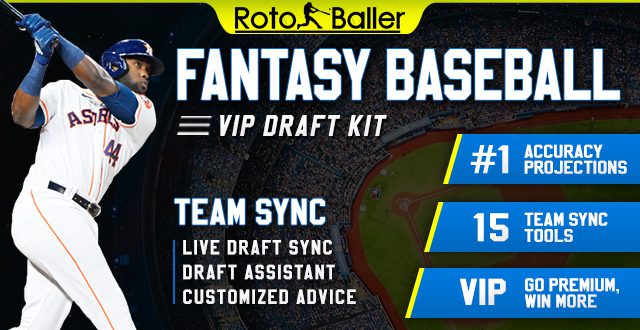
“To cut, or not to cut?” – Hamlet, more or less
It’s funny. We spend months combing through data, crunching numbers, strategizing, researching…and then the games start and almost immediately, the overreactions begin. An unproven player goes 0-for-20 to start the season. Should’ve known his September was a mirage. A veteran starter coming off a rough spring gets rocked and doesn’t escape the first inning in his debut. He doesn’t have it anymore. A closer’s velocity is down and he blows a save. Gotta be hurt.
Meanwhile, some guy you’ve barely heard of is hitting bombs or running wild on the bases or shutting out the best lineup in the game. You’re worried about the player currently stinking it up on your roster, and here’s this shiny new object just floating out there on the waiver wire. Yours for the taking – if you act now, and act decisively.
Be sure to check all of our fantasy baseball draft tools and resources:- Fantasy baseball draft kit
- Fantasy baseball rankings
- Team Sync platform and Draft Assistant
- Fantasy baseball mock draft simulator
- Fantasy baseball draft cheat sheets
- Fantasy baseball closer depth charts
- Fantasy baseball prospects
— Kyle Bishop (@amoralpanic) April 6, 2018
Taking the Long View
Striking quickly on the waiver wire is an important component of any winning fantasy season – ask anyone who snatched Aaron Judge up a week into last season. But it can also backfire spectacularly – ask anyone who blew a bunch of FAAB or top waiver priority on [pick an early-season save spec from literally any year ever].
The truth of the matter is that one week of a six-month season isn’t enough time to draw reliable conclusions about any player, even if Wil Myers getting hurt almost immediately after having to move back to the outfield feels like the most inevitable thing that’s ever happened. Hell, even an entire month can be misleading. At the end of last April, Jason Vargas had outpitched Clayton Kershaw, Eric Thames was doing a credible impression of peak Barry Bonds, and Byron Buxton (he of the top 50 ADP this spring) was hitting .147 with no home runs and one lousy stolen base. All of which is to say, a lot can and will change between now and year’s end. Don’t let #FOMO lead you to rash decisions.
I’m a firm believer in the idea that you should always have a general sense of how much of a leash you’re prepared to give to every player on your roster. This is particularly true in the early going. The draft wasn’t that long ago, so your prep should still be fresh enough to capably inform your managerial maneuvers. Obviously, this calculus varies from owner to owner, but every year, you hear of people cutting or selling low on players into whom they sank significant draft capital after only a few weeks of action. If one slump is enough to scare you off, why were you paying so much to land them in the first place?
Patience is one of the hardest things to learn and to exercise. And it’s certainly possible to overdo it. No one’s advocating for passivity over aggressiveness; too much of either could make you the latest example of, “you can’t win a championship in April, but you can lose it.” What we’re after is a good balance of both – assertiveness. Don’t be afraid to make a move; just remember that you shouldn’t be afraid to not make one. Far it be from me to suggest you should heed the sage advice of a Nebraskan rap rock band named after the police code for indecent exposure in Omaha, but as 311 once said, you’ve got to trust your instincts. (The “unless they’re telling you to drop Ozzie Albies right now” is heavily implied.)
If you really want to rage- and/or panic-drop your seventh-round pick already, neither I nor anyone else can stop you. This is still a free country for the moment. But you should think carefully before you do – and if you go through with it, at least let RotoBaller help you choose his replacement.
 RADIO
RADIO
























